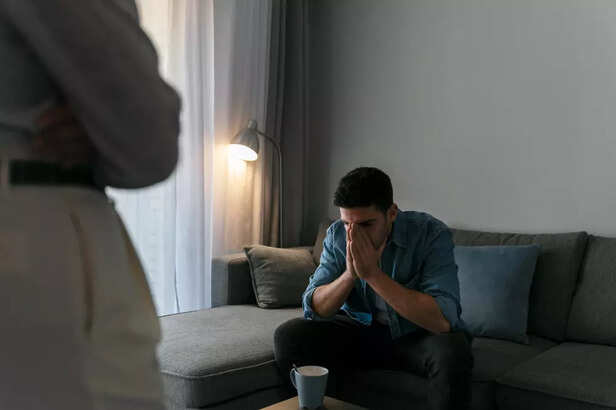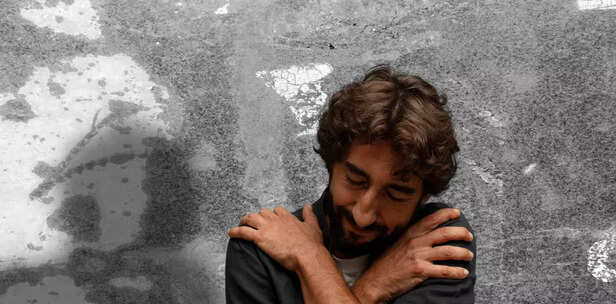Why Men are Choked Up by Society?
Manika | May 07, 2025, 14:21 IST
( Image credit : Freepik )
“I’m fine.” That’s what my friend said when I asked him how he was really doing. He smiled, shrugged, and quickly changed the topic - like he always does. But I could see it in his eyes: he wasn’t fine. How could he - He witnessed her girl getting crashed by truck through his naked eyes. And the more I thought about it, the more I realized how many men around me wear the same mask. For generations, they’ve been taught to “man up,” to be the strong one, to never let their guard down. But behind those firm nods and quiet responses lies a silent, growing crisis - one we can’t afford to ignore any longer.
Men’s mental health is an often overlooked aspect of public health, despite statistics painting a worrying picture. Globally, men are significantly more likely to die by suicide, with middle-aged and older men particularly at risk. In India, the National Crime Records Bureau (NCRB) reported in 2021 that out of the 1.64 lakh people who died by suicide, over 70% were men.
And yet, men are far less likely than women to seek help for psychological problems. According to a WHO study, men visit psychologists and psychiatrists much less frequently — not because they don’t suffer, but because they’ve been conditioned not to.
So WHY this silence?

From childhood, boys are told not to cry. "Ladke rote nahi (Boys don’t cry)," they hear. This message repeats throughout adolescence and adulthood: "Be strong," "Don’t be weak," "Handle it like a man." Society, media, and sometimes even family members uphold an ideal of masculinity that discourages vulnerability and emotions - unless that emotion is anger.
These ideas are not just outdated; they are dangerous.
What does this look like in real life? It looks like the father who suppresses his anxiety and stress to keep the household running. The young man in his 20s battling career uncertainty, heartbreak, and loneliness but joking it all off with his friends. The retired grandfather who feels purposeless and isolated but never speaks of it.

Yojit, a 26-year-old corporate executive in Jaipur, was always the go-getter. Smart, social, and dependable - the kind of guy friends turn to in a crisis. But nobody noticed the signs when he started withdrawing from conversations, missing deadlines, and skipping family dinners.
“I thought I was just tired,” he says. “Work was stressful, and I didn’t want to burden anyone.”
But Yojit wasn’t just tired. He was depressed.
It took a panic attack during a client presentation to force him to acknowledge it. "I couldn’t breathe. I genuinely thought I was having a heart attack." Only then did he speak to a therapist. Only then did he realize, what he had dismissed as stress was something deeper.
Yojit’s story is not rare. It’s representative of many men - who wait until they hit rock bottom before seeking help.
Another critical but under-discussed issue is how men often rely almost solely on romantic partners or spouses for emotional support. Unlike women, who tend to have multiple sources of emotional bonding with friends, siblings, communities, many men are conditioned to form few but intense emotional connections.
This becomes a ticking time bomb in the event of breakups, divorces or bereavement. When that one emotional outlet is lost, they are left completely untethered.
There’s also the issue of communication. Many women express emotional distress through crying or talking. Men often express it through irritability, aggression, withdrawal or substance use. Because of this, many cases of male depression go undiagnosed or misdiagnosed.
 To avoid appearing vulnerable, men may mask their emotions through alcohol, smoking, reckless driving or overwork. These behaviors aren’t just risky; they’re often self-destructive.
To avoid appearing vulnerable, men may mask their emotions through alcohol, smoking, reckless driving or overwork. These behaviors aren’t just risky; they’re often self-destructive.
Consider Rajiv, a 28-year-old software engineer in Bangalore. After losing his mother, he threw himself into work, working 15-hour days, drinking most nights. “If I kept moving, I didn’t have to think,” he says.
But unresolved grief doesn’t disappear. It festers. One day, it spills over in an argument, a breakdown, or something far worse.
There are several reasons men hesitate to seek mental health care:
Encourage Conversations at Home
Parents, especially fathers, should model emotional openness. Ask sons how they feel — and listen without judging or correcting.
Workplaces Need to Be Supportive
HR policies should include mental health days, confidential counseling services, and awareness sessions that address male mental health directly.
Media Representation Matters
The media has a responsibility to portray male vulnerability authentically. When male protagonists break down or seek therapy without shame, it helps normalize the conversation.
Peer Support Groups
Creating male-focused support groups can provide a safe space to share struggles, free from the fear of judgment.
Start Early
Schools should have gender-neutral mental health education. Teach boys that expressing emotions is a strength, not a flaw.
Government Campaigns
Government and public health initiatives should include male mental health in their outreach especially in high-risk sectors like farming, construction and the military.

The tides are slowly turning. Celebrities like Deepika Padukone, Hrithik Roshan, and Virat Kohli have spoken openly about therapy and emotional wellbeing opening the gates for conversations.
Social media too, often blamed for toxic comparisons, is becoming a platform for mental health advocacy. Pages like “Humans of Bombay” and “Men Against Violence and Abuse (MAVA)” are challenging harmful stereotypes.
Therapy is becoming less taboo. Younger men, especially in urban areas, are beginning to seek help earlier. Mental health apps, helplines, and affordable online counseling are bridging gaps.
But we still have miles to go.
It’s time to unlearn decades of toxic conditioning. It’s time to redefine what it means to be strong. Strength is not about suppression. It’s about survival. And survival is helped by support, not solitude.
Let’s teach our brothers, fathers, friends, and sons that they are allowed to feel. Allowed to hurt. And most importantly — allowed to heal.
Because silence is not strength. Speaking up is.
Explore the latest trends and tips in Health & Fitness, Travel, Life Hacks, Fashion & Beauty, and Relationships at Times Life!
And yet, men are far less likely than women to seek help for psychological problems. According to a WHO study, men visit psychologists and psychiatrists much less frequently — not because they don’t suffer, but because they’ve been conditioned not to.
So WHY this silence?
Cultural Conditioning and Masculinity

Stressed Men
( Image credit : Freepik )
From childhood, boys are told not to cry. "Ladke rote nahi (Boys don’t cry)," they hear. This message repeats throughout adolescence and adulthood: "Be strong," "Don’t be weak," "Handle it like a man." Society, media, and sometimes even family members uphold an ideal of masculinity that discourages vulnerability and emotions - unless that emotion is anger.
These ideas are not just outdated; they are dangerous.
What does this look like in real life? It looks like the father who suppresses his anxiety and stress to keep the household running. The young man in his 20s battling career uncertainty, heartbreak, and loneliness but joking it all off with his friends. The retired grandfather who feels purposeless and isolated but never speaks of it.
A Personal Story: Yojit’s Quiet Battle

Feeling sick while presentation
( Image credit : Freepik )
Yojit, a 26-year-old corporate executive in Jaipur, was always the go-getter. Smart, social, and dependable - the kind of guy friends turn to in a crisis. But nobody noticed the signs when he started withdrawing from conversations, missing deadlines, and skipping family dinners.
“I thought I was just tired,” he says. “Work was stressful, and I didn’t want to burden anyone.”
But Yojit wasn’t just tired. He was depressed.
It took a panic attack during a client presentation to force him to acknowledge it. "I couldn’t breathe. I genuinely thought I was having a heart attack." Only then did he speak to a therapist. Only then did he realize, what he had dismissed as stress was something deeper.
Yojit’s story is not rare. It’s representative of many men - who wait until they hit rock bottom before seeking help.
The Role of Relationships
Another critical but under-discussed issue is how men often rely almost solely on romantic partners or spouses for emotional support. Unlike women, who tend to have multiple sources of emotional bonding with friends, siblings, communities, many men are conditioned to form few but intense emotional connections.
This becomes a ticking time bomb in the event of breakups, divorces or bereavement. When that one emotional outlet is lost, they are left completely untethered.
There’s also the issue of communication. Many women express emotional distress through crying or talking. Men often express it through irritability, aggression, withdrawal or substance use. Because of this, many cases of male depression go undiagnosed or misdiagnosed.
Toxic Coping Mechanisms

Men taking Substance
( Image credit : Freepik )
Consider Rajiv, a 28-year-old software engineer in Bangalore. After losing his mother, he threw himself into work, working 15-hour days, drinking most nights. “If I kept moving, I didn’t have to think,” he says.
But unresolved grief doesn’t disappear. It festers. One day, it spills over in an argument, a breakdown, or something far worse.
Barriers to Seeking Help
- Stigma: Mental health is still associated with weakness in many parts of Indian society.
- Lack of Awareness: Many men don’t realize what they are going through is clinical anxiety, depression, or PTSD.
- Accessibility: Therapy is still inaccessible in rural areas and expensive in urban centers.
- Fear of Judgment: Men worry how friends, family, and coworkers will perceive them if they go to therapy or take medication.
Building a Better Future: What Can Be Done
Parents, especially fathers, should model emotional openness. Ask sons how they feel — and listen without judging or correcting.
Workplaces Need to Be Supportive
HR policies should include mental health days, confidential counseling services, and awareness sessions that address male mental health directly.
Media Representation Matters
The media has a responsibility to portray male vulnerability authentically. When male protagonists break down or seek therapy without shame, it helps normalize the conversation.
Peer Support Groups
Creating male-focused support groups can provide a safe space to share struggles, free from the fear of judgment.
Start Early
Schools should have gender-neutral mental health education. Teach boys that expressing emotions is a strength, not a flaw.
Government Campaigns
Government and public health initiatives should include male mental health in their outreach especially in high-risk sectors like farming, construction and the military.
Hope in Progress

Violence against Men
( Image credit : Freepik )
The tides are slowly turning. Celebrities like Deepika Padukone, Hrithik Roshan, and Virat Kohli have spoken openly about therapy and emotional wellbeing opening the gates for conversations.
Social media too, often blamed for toxic comparisons, is becoming a platform for mental health advocacy. Pages like “Humans of Bombay” and “Men Against Violence and Abuse (MAVA)” are challenging harmful stereotypes.
Therapy is becoming less taboo. Younger men, especially in urban areas, are beginning to seek help earlier. Mental health apps, helplines, and affordable online counseling are bridging gaps.
But we still have miles to go.
Healing Begins with Honesty
Let’s teach our brothers, fathers, friends, and sons that they are allowed to feel. Allowed to hurt. And most importantly — allowed to heal.
Because silence is not strength. Speaking up is.
Explore the latest trends and tips in Health & Fitness, Travel, Life Hacks, Fashion & Beauty, and Relationships at Times Life!
